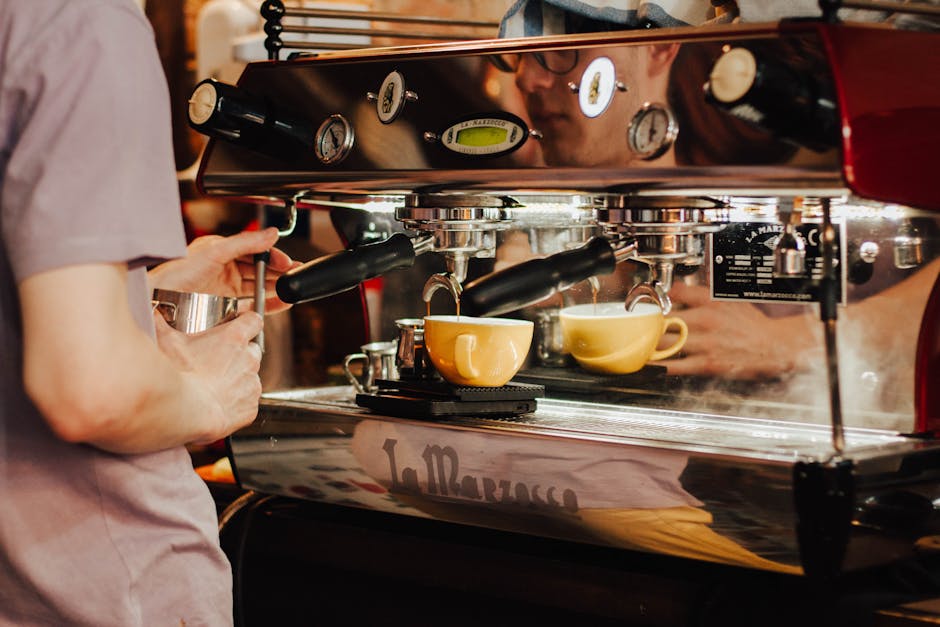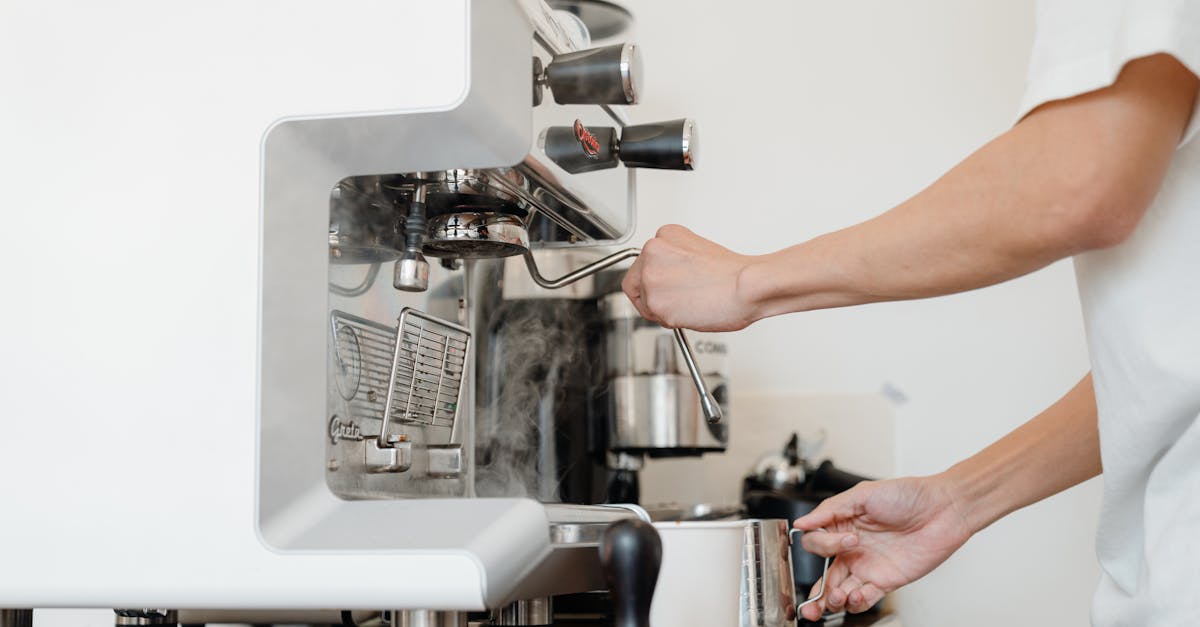Manual coffee grinder or electric coffee grinder – what are the differences?


“Whether you choose a manual coffee grinder or an electric coffee grinder, the key to a delicious cup of coffee is not only in the bean, but in the experience and precision of the grinding process.”
A duel in the world of coffee: manual or electric coffee grinder
Talk about in-country problems, right? But for the inveterate coffee lover, the choice between manual and electric coffee grinders is as important as choosing between vinyl and Spotify. We’re talking aromas that dance in limbo under your nose and flavors that come on like a carnival in Rio. A manual coffee grinder is powered by muscle and sweat, while the electric counterpart does the work for you. So what makes them different? In short, the manual grinder is your old faithful friend that is always there, while the electric one is like a state-of-the-art drone that does the work for you. Charm meets efficiency and the atmosphere is denser than an espresso shot.
Manual coffee grinder – charmingly traditional
The hand crank is in motion and the coffee beans are being ground. In a manual coffee grinder, you are king or queen of the grinding process. Manual coffee grinders are beautiful, at least we at White Elk Coffee think so. They are like works of art in stainless steel or ceramic, enhancing both the look of the kitchen and the spirit of the person turning the handle. The individual’s touch translates into precision in the grind, creating a consistency that even the snobbiest coffee hipsters in town can’t complain about. The manual coffee grinders can be small and easy to take with you, perfect to throw in your backpack for a weekend trip to the woods or for playtime when the kids have a sports activity.
The benefits of a hand-powered ritual
If you’re looking for precision and want full control over how your coffee is ground, then manual coffee grinding is for you. It’s like a little ceremony every morning – a dance between you and the mill. It’s 100% eco-friendly because it only requires a little muscle and a willingness to get that perfect grind. And let’s not forget – no electricity, no cables, just you and the mill. A manual coffee grinder is an obvious choice for those who want to keep track of their carbon footprint.
If you’re looking for a manual coffee grinder, we think Hario has made a perfect one. You’ll find it among our coffee equipment: Hario Coffee Grinder Mini Slim Plus.
When time is not on your side
But let’s be honest, some mornings you don’t have time to play millwright. Chasing minutes in the morning can make manual grinding feel like an eternity. And if you’re the type to invite a small army home for Sunday coffee, the limited capacity of manual grinders can give you a nervous breakdown before the first cup is served. Plus, with some models, you have to work a little harder to maintain that precise grind you want.
Electric coffee grinder – modern efficiency
Then the electric coffee grinder is perfect in its non-stop productivity and serviceability. At the touch of a button, your coffee grinds itself while you muddle through all the other morning chores. In addition, you can often set the exact grinding degree you want. Looking for that coarse grind for your French press or a fine grind that makes your espresso pop? An electric grinder can do it!
Speed and convenience at the touch of a button
With an electric coffee grinder, you can set the accuracy to one decimal place and the algorithm ensures that the result is exactly the same every time. It’s like having a barista hidden inside the grinder, ready to make your coffee dreams come true. What about versatility? Whether it’s espresso, drip or press, the vast majority of electric grinders work well. It might feel like cheating given how easy it is, but no one will judge you as they sip a cup of silky smooth coffee.
When convenience comes at a cost
But remember, no good comes without evil. Electricity bills are part of the calculation and a stylish electric coffee grinder can cost you a pretty penny to buy. Plus, if you’re the type of person who doesn’t like complicated cleaning instructions, maintenance can feel like a necessary evil. And sure, you don’t get the same pourover romance as with a manual grinder, and sometimes the machine sounds like a jet plane in the takeoff phase. So how much is convenience worth to you? This is a question you need to ask yourself.
Which coffee grinder wins your heart?
Here we are at a crossroads with a coffee grinder in each hand. Your lifestyle, your morning rituals, and your taste buds hold the ballots. Do you prefer a slow morning coffee grinding session as a mindfulness exercise, or are you the slightly more stressed type and want to get the job done quickly and efficiently? Whatever your budget, your coffee consumption and your level of electricity dependence, there is a grinder for everyone. It’s about finding the right one for your needs and never forgetting that the best cup of coffee is the one made with love.

FAQ – Manual coffee grinder or electric coffee grinder – what are the differences?
What are the main advantages of a manual coffee grinder?
The main advantages of a manual coffee grinder are the high precision of the grinding degree and the environmentally friendly aspect of not requiring electricity. The user is given full control over the grinding process, which can contribute to a more uniform and consistent grind. Manual grinders are often made of high-quality materials such as stainless steel or ceramic, durable and easy to take on trips.
How does the grinding capacity differ between manual and electric coffee grinders?
The grinding capacity of manual coffee grinders is usually more limited than that of electric grinders. A manual grinder requires time and physical effort for each round, which can be demanding if you brew coffee in large quantities. Electric coffee grinders, on the other hand, can handle larger volumes of beans quickly and efficiently using electricity and multiple settings.
Are manual coffee grinders really more environmentally friendly than electric ones?
Yes, manual coffee grinders are more environmentally friendly as they are powered solely by hand and require no electricity. This means that they do not contribute to electricity use and CO2 emissions in the same way as electric mills do. This makes them a better choice for environmentally conscious coffee enthusiasts.
Can you get the same consistent grinding rate with a manual mill as with an electric one?
While a manual mill can provide a very uniform and consistent grind, it may require more skill and effort to maintain precise grind settings. Low-quality electric mills can sometimes be less consistent, but high-quality electric mills are usually equipped with advanced settings that achieve consistent grinding with great precision.
What should I consider when choosing between manual and electric coffee grinders?
When choosing between manual and electric coffee grinders, you should consider your lifestyle, how much time you want to spend on the brewing process, your budget and your taste preferences. For those who appreciate a slow morning routine, a manual grinder may be ideal, while an electric model will suit those who prioritize speed and convenience. Also take into account coffee consumption, desired grind size and the availability of electricity when making your decision.

Photo by Mateusz Dach on Pexels
Photo by Michael Burrows on Pexels
Photo by Tim Douglas on Pexels
Continue reading
-

Pregnant and decaffeinated: safe for you and the baby?
“Decaf during pregnancy: A safe guide for expectant mothers” Decaffeination during pregnancy is an important issue for many. Pregnancy affects the body’s ability to break…
-

Coffee and health: anti-inflammatory or villain?
**Coffee and Inflammation: A Complex Relationship** Coffee is one of the world’s most widely consumed beverages and contains antioxidants that can reduce inflammation and protect…
-

Coffee and weight – are you getting the balance right?
Coffee and weight – Find your edge without tipping the scales Coffee and weight is a hot topic in health. Black coffee, with its low…
-

The truth about decaf – is it really good?
The truth about decaffeinated coffee: Is decaffeinated coffee good for you? Decaffeinated coffee is a healthy option for those who want to avoid the negative…
-

Coffee acidity: health and taste perception
The acidity of the coffee is influenced by its pH value, which is between 4.85 and 5.10. Is coffee sour? Yes, and this is due…
-

Pre-exercise coffee – does performance increase with each cup?
Drinking coffee before exercise can improve both strength and endurance, thanks to the stimulating effects of caffeine on the central nervous system. For best results,…
-

Coffee and antioxidants: your healthy cup?
**Coffee and antioxidants: a healthy cup Coffee is one of the major sources of antioxidants in Western diets, which can help reduce the risk of…
-

Turmeric in coffee – a health boost in your cup
Turmeric in coffee has become a popular trend among health enthusiasts thanks to its anti-inflammatory and antioxidant properties. Adding turmeric to your coffee can improve…
-

Roast for body in the coffee
Body in coffee refers to the fullness and mouthfeel of the coffee. It is influenced by brewing methods such as French press and espresso, as…
-

The role of coffee in the quest for a longer life
Coffee is a popular morning ritual that not only increases alertness but also contributes to a longer life. Studies show that coffee, rich in antioxidants,…
-

Coffee and health: upgrading your coffee with superfoods
**Coffee and Health: Upgrade your coffee with superfoods** Give your coffee a health boost by adding superfoods such as cinnamon, ginger, mushrooms, turmeric, maca and…
-

Is coffee dehydrating or hydrating?
**Is coffee dehydrating or hydrating? Coffee is one of the world’s most loved drinks, but is it dehydrating? Research shows that moderate coffee consumption (1-2…
-

Enjoy and feel better: 9 unexpected benefits of coffee
**Your health in a coffee cup: Benefits of coffee** Coffee, a global favorite beverage, offers many health benefits that are often overlooked. In addition to…
-

Taste guide: Detecting roasting defects in your coffee cup
Detect roasting defects in the coffee cup and improve the taste experience of the coffee. Learn to identify common defects such as underdevelopment, baked taste,…
-

The home roaster’s guide to the right green coffee
Discover the adventure of green coffee and learn how to roast at home with our comprehensive guide to buying the right green coffee. Understand the…
-

All about how coffee is harvested
A journey through the coffee harvest describes in detail how coffee is harvested, from ripe coffee berries to finished beverage. Harvesting is mainly done by…
-

Exploring third wave coffee
**From the origin of the bean to your coffee barrel: A journey with third wave coffee** The coffee industry is a global giant, covering everything…
-

Coffee with balance: decaf vs low-caf
Low-caf coffee offers a balanced solution for coffee lovers who want to avoid the negative effects of caffeine. While traditional coffee and decaf often have…
-

How to turn coffee beans into decaffeinated coffee
### How to turn coffee beans into decaffeinated coffee Decaffeinated coffee, or decaffeinated coffee, removes the majority of caffeine from the beans to avoid negative…
-

Refine your brewing art by blooming your pour over coffee
Optimize the taste of your coffee with the art of bloom pour over coffee. Flowering of coffee is a crucial step to release gases and…
-

Create a unique brand for your café – here’s how!
Creating a strong café brand means defining your ‘why’ and mission to stand out from the crowd. By integrating core values like sustainability and community…
-

Should I use different coffee filters for different roasting profiles?
Discover how coffee filters affect the taste experience! Using the right coffee filter is essential to bring out the unique flavors of each coffee variety.…
-

How to make an espresso martini at home
“Create the perfect espresso martini at home with simple ingredients like vodka, coffee liqueur, fresh espresso and simple syrup. Rooted in 1980s London, this classic…
-

Lungo: when espresso takes a bigger leap
Lungo is a coffee drink that is gaining ground in Sweden, a milder espresso with extended brewing time that provides a larger amount of coffee…
-

The charms of the Perculator – a coffee experience like no other
Experience the rich flavor of percolator coffee, a traditional brewing method that offers depth and complexity. The perculator is quick and easy, perfect for busy…
-

Do you know the coffee berry?
Discover the importance of coffee berries in the coffee flavor journey, from lush plantations to your cup. Learn about the different layers of the berry,…
-

Headache from coffee: 6 unexpected reasons
Discover the causes of coffee headaches, from caffeine withdrawal to overdose and caffeine allergy. Coffee can cause both concentration and headaches, with withdrawal symptoms and…
-

Arabica coffee beans – a world of flavor variations
Arabica coffee beans offer coffee lovers a wealth of flavors thanks to its diverse varieties such as Bourbon, Typica and Geisha. These beans, which dominate…
-

Flavor development during roasting: the magic of the griddle effect
The grinding effect is central to the transformation of the coffee bean during roasting, creating hundreds of aroma compounds that make the coffee rich and…
-

Top tips for making French press coffee
Discover the art of brewing perfect French press coffee by selecting fresh coffee beans, achieving the ideal grind and balancing the coffee-water ratio for a…
-

Attracting more café guests – your guide to a vibrant meeting place
Welcome all café guests to a place where the details create a unique atmosphere. To successfully attract visitors, cafés should strengthen their digital presence and…
-

How to use different cups for different coffees
Discover how cups for coffee can change your taste experience. Research shows that the shape of the cup affects the aroma, sweetness and acidity of…
-

Coffee giant Brazil: a deep dive into the kaleidoscope of culture
Brazil is not only known for its culture of music and carnival, but it is also a global coffee giant whose coffee traditions go back…
-

Clean your coffee grinder like a pro – for flavor
Regular cleaning of the coffee grinder is essential for an optimal coffee experience. An unclean grinder negatively affects the taste through the accumulation of old…
-

Flat white – more than just milk and coffee
More than just milk and coffee, flat white is a global coffee experience that originated in Australia and New Zealand, and has captured the hearts…
-

Ristretto – Italy’s flavorful little guy
In Italy, ristretto is more than just coffee; it is a concentrated pleasure and part of the culture. This intense espresso variant is characterized by…
-

Storing coffee beans properly: guide and tips
Learn how to store coffee beans optimally to preserve flavor and freshness. Avoid air, moisture, heat and light with airtight, dark containers and the right…
-

Growing coffee in Uganda: one bean’s journey to perfection
Uganda, a leading coffee producer, offers a wealth of flavors from the nutrient-rich red soil. The country is known for its Arabica and Robusta coffees,…
-

Mexico’s forgotten beans: a journey into the coffee kingdom
Discover Mexico’s hidden coffee gems, where small-scale farms with big hearts grow organically and responsibly, contributing to a rich flavor profile ranging from fruity notes…
-

Cortado – more than just coffee and milk
Experience cortado, a Spanish specialty coffee that combines strong espresso with silky milk in a perfect balance. With the right espresso beans and gently frothed…
